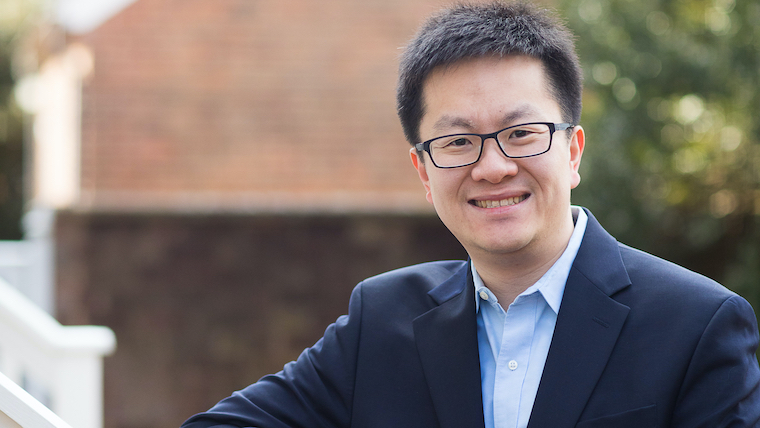
Chongzhi Zang, PhD, and his collaborators have revealed a process critical to organ development for our lungs, liver and digestive tract.
A new discovery from the School of Medicine has shed light on how our digestive tract, lungs and liver form, and that finding could have important implications for our understanding of cancer.
During development in mammals, the stomach, colon, intestines, pancreas, liver, lungs, esophagus, pharynx (throat) and thyroid all form from what is called a “primitive gut tube.” But scientists have been uncertain exactly what prompts the indistinguishable cells in the gut tube to turn into, or “differentiate,” into the various organs. How, exactly, does a cell in the gut tube know it should become part of our lung instead of part of our stomach?
UVA’s Chongzhi Zang, PhD, and collaborators have found answers, revealing how genetic material called chromatin interacts with other factors to switch genes on and off to carry out this essential transformation.
“Gut development is a fascinating dynamic process, from which we can learn how the same genome can create many different types of cells in different organs,” said Zang, of UVA’s Center for Public Health Genomics and UVA Cancer Center. “We knew the genes being used in different organs would start to show some differences in the early stages of development, but this was the first time that we found how such differences were controlled by chromatin during the organ-formation process.”
Understanding Organ Development
Zang and his colleagues, including collaborators led by Tae-Hee Kim, PhD, of the University of Toronto in Canada, used cutting-edge genomics technology called “single-cell ATAC-seq” to create a detailed “map” of the chromatin pattern changes that take place inside individual cells in the gut tube during organ formation in mice. In so doing, they have filled in many important gaps in our understanding of the organ-development process in mammals.
The team found that chromatin displays different dynamics in cells that become the liver, for example, than in cells that become the lungs. Chromatin interacts with what are called “transcription factors” in an elegant arrangement that trains the cells for the important jobs they are fated to hold.
Later in development, these interactions will further refine the emerging organs, allowing the intestine, for example, to subdivide into the large intestine and the small intestine.
It’s important that this complex process play out precisely. The researchers found that errors can have dire consequences, disrupting, for example, the healthy development of the pancreas and intestines in lab mice. Dramatic changes noted in the pancreas included the formation of many large, cyst-like structures.
The researchers note that “cell fate” errors occur in the early stages of pancreatic cancer, leading to precancerous lesions. So understanding the organ-development process and what can go wrong could offer important insights into the formation of certain cancerous tumors.
“A better understanding of how genes work in the genome during organ development can give us insights into the mechanisms underlying initiation of many types of cancer,” Zang said. “We use state-of-the-art technologies to tackle these complex problems and believe that these fundamental discoveries, one step at a time, will eventually inspire new therapeutic development and benefit cancer patients in the future.”
Findings Published
The researchers have published their findings in the scientific journal Nature Communications. This work was spearheaded by three young scientists, including two graduate students: Ryan J. Smith of the University of Toronto; Hongpan Zhang of the UVA School of Medicine’s Biomedical Sciences (BIMS) Graduate Program; and Shengen Shawn Hu, a research scientist in Zang’s lab. The team also included Theodora Yung, Roshane Francis, Lilian Lee, Mark W. Onaitis, Peter B. Dirks, Zang and Kim.
Zang is a member of the School of Medicine’s Department of Public Health Sciences and Department of Biochemistry and Molecular Genetics. He is also part of UVA’s Department of Biomedical Engineering, a collaboration of the School of Medicine and the School of Engineering.
The research was supported by SickKids Foundation, the Canadian Institutes of Health Research, Cancer Research Society, Natural Science Research Council of Canada, a SickKids Restracomp graduate student fellowship and funds from the UVA School of Medicine and UVA Cancer Center.
UVA Cancer Center is one of only 52 cancer centers in the country to be designated a Comprehensive Cancer Center by the National Cancer Institute. The designation recognizes elite cancer centers with the most outstanding cancer programs in the nation. Comprehensive Cancer Centers must meet rigorous standards for innovative research and leading-edge clinical trials.
UVA Cancer Center is the only Comprehensive Cancer Center in Virginia.
MORE FROM ZANG: UVA reveals how sleeping immune cells wake to fight familiar foes.
New tools to battle cancer, boost genomics research.



